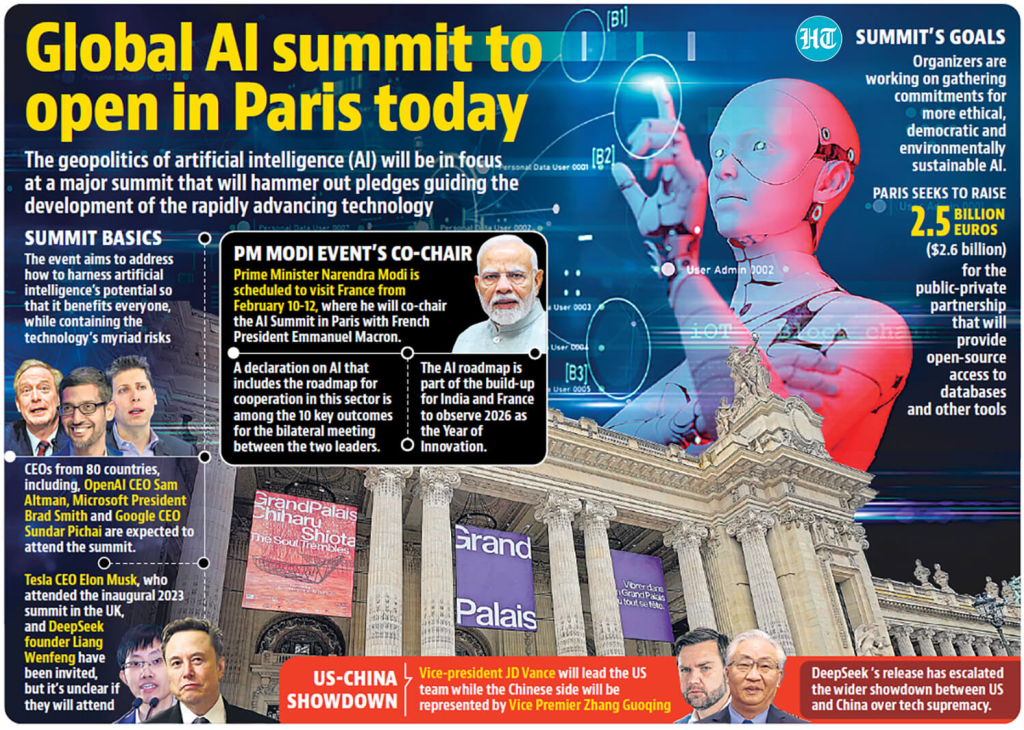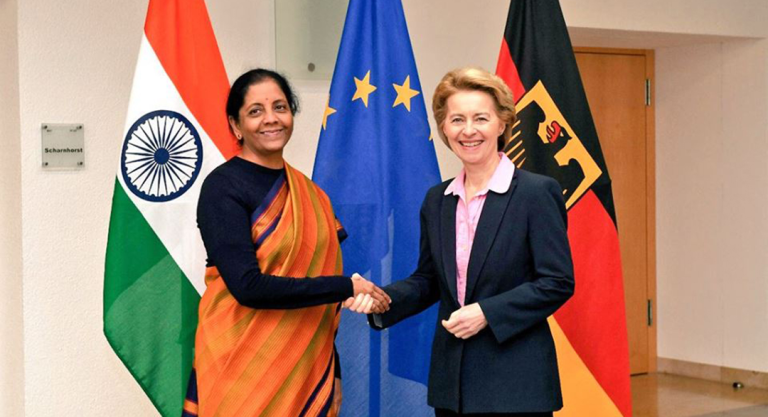The Paris AI Summit gathers world leaders to discuss AI governance, economic impacts, and ethical standards. India aims to position itself as an AI hub, while global leaders advocate policies on AI-driven industries.
Paris AI Summit 2025
As AI governance and industrial dominance take center stage at the Paris AI Summit, global leaders will discuss artificial intelligence’s future in shaping economies, security, and ethical standards. With Indian Prime Minister Narendra Modi at the forefront, India is positioning itself as a key AI player, leveraging its vast talent pool, emerging AI startups, and expanding digital economy.
The presence of world leaders highlights AI’s critical role in geopolitics, economic strategies, and technological innovation. Here’s what each leader aims to contribute:
Key Global Leaders and Their AI Agenda
Narendra Modi – Prime Minister of India
- Advocating India’s position as a global AI hub with responsible AI development.
- Seeking strategic AI collaborations with global tech giants for digital governance and economic growth.
Olaf Scholz – Chancellor of Germany
- Pushing for EU-led AI regulations to ensure fair competition and innovation.
- Supporting AI in industrial automation and Germany’s high-tech manufacturing sector.
Justin Trudeau – Prime Minister of Canada
- Promoting Canada’s AI research ecosystem and ethical AI governance.
- Advocating AI policies balancing economic growth with human rights.
Ursula von der Leyen – President of the European Commission
- Spearheading the EU’s AI Act to establish global AI regulatory standards.
- Emphasizing AI-driven climate solutions and sustainable innovation.
Guoqing Zhang – Vice Premier of China
- Championing China’s AI leadership in autonomous tech and digital governance.
- Navigating AI’s role in global trade and China’s influence in AI-driven economies.
Alexander Schallenberg – Chancellor of Austria
- Advocating AI in cybersecurity and European digital sovereignty.
- Supporting AI-driven public services and economic efficiency.
Paul Kagame – President of Rwanda
- Promoting AI as a tool for Africa’s digital transformation.
- Seeking AI investments in education, healthcare, and governance.
Antonio Guterres – UN Secretary-General
- Calling for global AI ethics and regulations to ensure fairness and inclusivity.
- Pushing for AI-driven sustainable development goals (SDGs).
Dick Schoof – Prime Minister of the Netherlands
- Supporting AI in digital banking, agriculture, and logistics.
- Advocating for European AI leadership and transatlantic cooperation.
Kyriakos Mitsotakis – Prime Minister of Greece
- Encouraging AI in tourism, maritime industries, and public governance.
- Discussing AI’s role in cybersecurity and national infrastructure.
Alar Karis – President of Estonia
- Showcasing Estonia’s success in AI-driven digital governance.
- Pushing for AI applications in e-governance and public administration.
Edgars Rinkevics – President of Latvia
- Promoting AI in cybersecurity and national defense.
- Advocating for fair AI regulations in small economies.
Ulf Kristersson – Prime Minister of Sweden
- Discussing AI’s role in sustainability and green technology.
- Supporting AI in industrial research and healthcare advancements.
Petteri Orpo – Prime Minister of Finland
- Strengthening Finland’s AI research and ethical AI deployment.
- Advocating AI in public services and economic policy.
Luc Frieden – Prime Minister of Luxembourg
- Encouraging AI adoption in finance and digital assets.
- Supporting EU-wide AI regulations for responsible development.
Micheál Martin – Taoiseach (Prime Minister of Ireland)
- Discussing AI in data privacy and ethical AI frameworks.
- Promoting Ireland’s AI-driven tech sector and startup ecosystem.
Andrej Plenkovic – Prime Minister of Croatia
- Advocating AI in smart infrastructure and digital transformation.
- Supporting EU-led AI governance strategies.
Robert Golob – Prime Minister of Slovenia
- Promoting AI research and Slovenia’s role in the EU’s AI strategy.
- Discussing AI-driven sustainability initiatives.
Faure Gnassingbé – President of Togo
- Pushing for AI in economic modernization and digital inclusion in Africa.
- Exploring AI-driven agricultural and healthcare advancements.
Peter Pellegrini – President of Slovakia
- Advocating AI in automotive and industrial automation.
- Supporting AI for public administration and governance.
Petr Pavel – President of the Czech Republic
- Focusing on AI’s impact on national security and defense.
- Encouraging AI investments in Central Europe’s digital economy.
Azali Assoumani – President of the Comoros
- Exploring AI’s role in economic modernization and public services.
- Advocating AI adoption for climate resilience in small island nations.
Vjosa Osmani – President of Kosovo
- Pushing for AI in governance and digital transformation.
- Advocating AI investments to drive economic growth in emerging economies.
China, DeepSeek could be the buzzword
There is one major difference between this year’s gathering, and the inaugural summit that happened in the UK in 2023: China, and DeepSeek, a low-cost model from the country, which has challenged the hitherto US domination in the AI field. So far, it was largely US companies like OpenAI, Microsoft and Google, which were setting the AI narrative – they had access to the most cutting-edge hardware made by another American company in Nvidia and also access to the best AI talent in the world.
India in focus
The Second India-France Al Policy Roundtable has been planned as a side event during the Summit. It will deliberate on key policy positions regarding global Al development and explore opportunities for synergy between India and France.
India AI Mission
The Indian government’s commitment to advancing artificial intelligence (AI) technology is evident with its new budgetary allocation for the India AI Mission. The Ministry of Electronics and Information Technology has been allocated Rs 551.75 crore in the Union Budget 2024-25 to enhance AI infrastructure, including the procurement of high-performance Graphic Processing Units (GPUs).
Objective: The mission aims to establish a robust AI computing infrastructure in India to support the development and testing of AI systems.
India has also decided to build a domestic large language model (LLM) of its own as part of the India AI Mission and has called for proposals from companies that are looking to build the models. India has maintained that the weaponisation represented by social media must be overcome and steps should be taken to ensure AI represents safety and trust, even as the technology represents a big opportunity.
The two countries will declare that 2026 will be celebrated as India-France Innovation year and launch a logo. Macron and Modi will visit the city of Marseille and inaugurate an Indian consulate there. Marseille is also a strategic telecommunications connection hub. Its location at the heart of the Mediterranean makes it the gateway for submarine cables linking Europe to Africa, West Asia and Asia. Submarine cables carry 99% of the world’s data traffic (internet and telephony).










